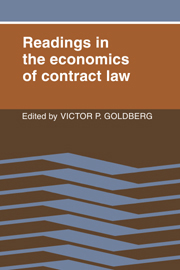Book contents
- Frontmatter
- Contents
- Preface
- Readings in the economics of contract law
- Part I Some preliminaries
- Part II Contract law and the least cost avoider
- Part III The expectation interest, the reliance interest, and consequential damages
- 3.1 The reliance interest in contract damages
- 3.2 Note on price information and enforcement of the expectation interest
- Questions and notes on protecting the property interest in the price
- 3.3 The contract–tort boundary and the economics of insurance
- 3.4 Notes on the reliance interest
- Questions and notes on fault, consequential damages, and reliance
- Part IV The lost-volume seller puzzle
- Part V Specific performance and the cost of completion
- Part VI Power, governance, and the penalty clause puzzle
- Part VII Standard forms and warranties
- Part VIII Duress, preexisting duty, and good faith modification
- Part IX Impossibility, related doctrines, and price adjustment
- Questions and notes on impossibility and price adjustment
- References
- Index of cases
- Author index
- Subject index
3.2 - Note on price information and enforcement of the expectation interest
Published online by Cambridge University Press: 10 November 2010
- Frontmatter
- Contents
- Preface
- Readings in the economics of contract law
- Part I Some preliminaries
- Part II Contract law and the least cost avoider
- Part III The expectation interest, the reliance interest, and consequential damages
- 3.1 The reliance interest in contract damages
- 3.2 Note on price information and enforcement of the expectation interest
- Questions and notes on protecting the property interest in the price
- 3.3 The contract–tort boundary and the economics of insurance
- 3.4 Notes on the reliance interest
- Questions and notes on fault, consequential damages, and reliance
- Part IV The lost-volume seller puzzle
- Part V Specific performance and the cost of completion
- Part VI Power, governance, and the penalty clause puzzle
- Part VII Standard forms and warranties
- Part VIII Duress, preexisting duty, and good faith modification
- Part IX Impossibility, related doctrines, and price adjustment
- Questions and notes on impossibility and price adjustment
- References
- Index of cases
- Author index
- Subject index
Summary
Suppose that on April 1, Able enters into a contract to sell a commodity to Baker at a price of $2.00 per bushel for delivery at Baker's plant on June 1. Five days later, Able changes his mind and says he wants to withdraw the promise. Baker, meanwhile, has done nothing in reliance upon the existence of this particular contract. What functions are served by enforcing this purely executory agreement in the absence of any evidence that Baker has relied upon the existence of the contract? This is the question posed by Fuller and Perdue. The answers to this question can be divided into two categories: practical and conceptual. The former are less interesting and I will get them out of the way quickly.
Three practical reasons for not requiring evidence that the promisee relied in any way on the contract are (a) it would complicate the litigation with a messy fact question of whether the promisee had indeed relied; (b) the promisee might be encouraged to act in a manner that established his reliance to lock in a good deal, even if this action would be inefficient; for example, he might enter into a resale contract specifying delivery of the goods associated with this particular contract rather than promising to sell goods that met certain specifications; (c) requiring reliance might induce the promisor to expend resources to determine whether or not particular promisees did rely, an inquiry that would serve no useful purpose.
With an executory commodity contract, the promisee can avoid the costs arising from untimely contracting. Entering into a contract too close to the performance date can raise costs.
- Type
- Chapter
- Information
- Readings in the Economics of Contract Law , pp. 80 - 83Publisher: Cambridge University PressPrint publication year: 1982
- 1
- Cited by



